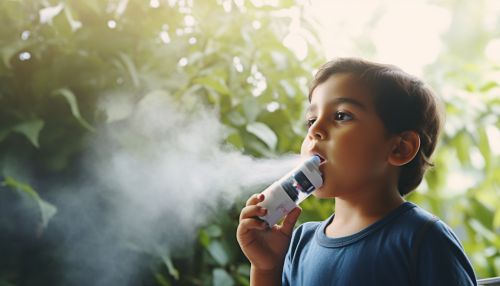Asthma in children
Definition and Overview
Asthma is a chronic lung disease that inflames and narrows the airways, causing recurring periods of wheezing, chest tightness, shortness of breath, and coughing. Asthma in children, also known as pediatric asthma, is a significant health concern due to the smaller size of children's airways. This condition can be more severe in children than in adults and can lead to serious complications if not properly managed.


Causes and Risk Factors
The exact cause of asthma in children is unknown. However, it is believed to be caused by a combination of genetic and environmental factors. Children with a family history of asthma are at a higher risk of developing the condition. Environmental factors such as exposure to allergens, tobacco smoke, and viral infections can also trigger asthma symptoms. Additionally, children with certain allergies or who are overweight may be more likely to develop asthma.
Symptoms
The symptoms of asthma in children can range from mild to severe and can vary from one episode to the next. Common symptoms include frequent coughing spells, less energy during play, rapid breathing, shortness of breath, wheezing, and tightness in the chest. It's important to note that these symptoms can also be caused by other conditions, so a proper diagnosis from a healthcare professional is essential.
Diagnosis
Diagnosing asthma in children can be challenging, especially in children under 5 years of age. The diagnosis is usually based on the child's symptoms, medical history, and physical examination. Tests such as spirometry and peak flow measurement can be used to measure how well the child's lungs are working. In some cases, a trial of asthma medicines may be used to see if they improve the child's symptoms.
Treatment and Management
The goal of asthma treatment is to control the disease and prevent asthma attacks. This is usually achieved through a combination of long-term control medications, which are taken daily to control inflammation and prevent symptoms, and quick-relief (rescue) medications, which are used to treat asthma attacks. It's also important for children with asthma and their caregivers to learn how to manage the condition, avoid triggers, and recognize and treat asthma attacks.
Prognosis
With proper treatment and management, most children with asthma can lead normal, active lives. However, some children may continue to have symptoms into adulthood. In some cases, children may outgrow asthma, but for others, the condition may be a lifelong issue.
Impact on Quality of Life
Asthma can have a significant impact on a child's quality of life. It can limit a child's physical activity, lead to missed school days, and cause anxiety and fear of asthma attacks. However, with proper management, most children with asthma can participate in activities and lead normal lives.
Prevention
While there is no known way to prevent asthma, there are steps that can be taken to reduce a child's risk of developing the condition and to prevent asthma symptoms. These include avoiding exposure to asthma triggers, such as allergens and irritants, and managing other conditions that can contribute to asthma, such as allergies and obesity.
